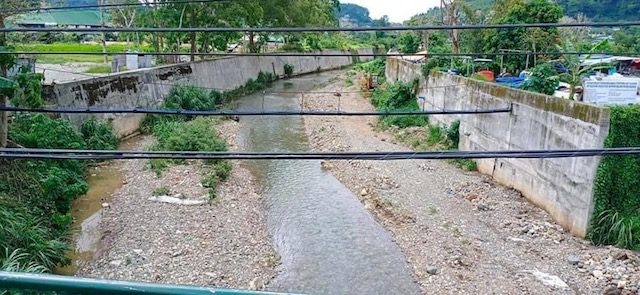SUMMARY
This is AI generated summarization, which may have errors. For context, always refer to the full article.

BAGUIO CITY, Philippines – Balili River, which traverses the eastern part of Baguio into La Trinidad, has been classified as almost biologically dead for most of the year.
In June last year, the Department of Environment and Natural Resources (DENR) said it would rehabilitate the river, noting that it had a far higher fecal coliform level than that of the Manila Bay at the time.
But during the COVID-19 crisis, which forced Baguio City and Benguet to go into enhanced community quarantine (ECQ) that kept tourists away and restricted many industries and businesses, the quality level of Balili improved remarkably.
City Environment and Parks Management Officer-in-Charge Rhenan Diwas said that since the ECQ, the wastewater influent and effluent of the 34-year-old Baguio Sewerage Treatment Plant (BSTP) have almost cleared.
Diwas said the influent and effluent have became compliant with the water quality standards of the DENR.
A photo right after Tropical Storm Ambo showed the waters in La Trinidad turning clear, compared to its blackish hue in normal days.
Based on the water test result conducted by the CEPMO-Wastewater, Water and Air Monitoring Division (WAMD), the wastewater influent (raw) in February 2020 reached almost the maximum level at 8,557.18 m3/day but dropped remarkably to 4,369. 97 m3/day in March 2020.
The wastewater quality also improved and now falls within the standards set under DENR Administrative Order 1990-35 (Effluent Standards for Different Water Quality Parameter and DAO 2016-08 (Water Quality Guidelines and General Effluent Standards) whereas it gained failed laboratory results from January to February 2020.
Diwas said that the decreased population of Baguio and La Trinidad during ECQ was a big factor in the cleaning of Balili River.
“Likewise, the closure of majority of the commercial activities (restaurants) and limited operation of public market and slaughter house were seen as contributory to the less turbid wastewater discharges,” Diwas said.
Baguio and Benguet set up a task force for Balili River more than ten years ago to address the pollution of this important city river.
Riding on the unexpected cleansing of Balili, Diwas cited several actions for the task force to pursue:
- Proceed with the rehabilitation and upgrading of the Baguio Sewerage Treatment Plant to expand its coverage to other barangays
- Continue the rehabilitation of sewer lines
- Improve Septage Management System, which include an additional septage facility
- Rehabilitate the public market to include its own sewerage facility
- Transfer the Slaughter House outside central business district and to include a sewerage facility for animal waste and others
Baguio residents and concerned groups had earlier banded together to form the “Save Balili River” coalition to work on restoring the waterway to its former pristine state. Part of the problem was the presence of over 100 piggeries that dump their waste into the river. – Rappler.com
Add a comment
How does this make you feel?
![[In This Economy] A counter-rejoinder in the economic charter change debate](https://www.rappler.com/tachyon/2024/04/TL-counter-rejoinder-apr-20-2024.jpg?resize=257%2C257&crop=267px%2C0px%2C720px%2C720px)
![[Vantage Point] Joey Salceda says 8% GDP growth attainable](https://www.rappler.com/tachyon/2024/04/tl-salceda-gdp-growth-04192024.jpg?resize=257%2C257&crop_strategy=attention)
![[ANALYSIS] A new advocacy in race to financial literacy](https://www.rappler.com/tachyon/2024/04/advocacy-race-financial-literacy-April-19-2024.jpg?resize=257%2C257&crop_strategy=attention)


There are no comments yet. Add your comment to start the conversation.